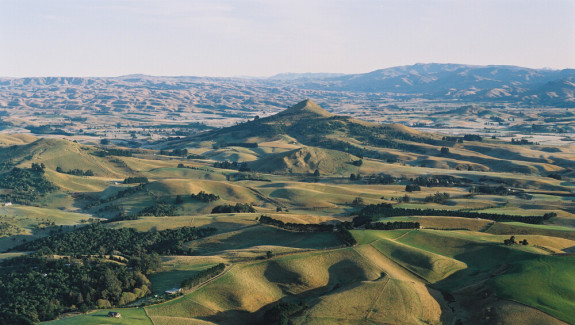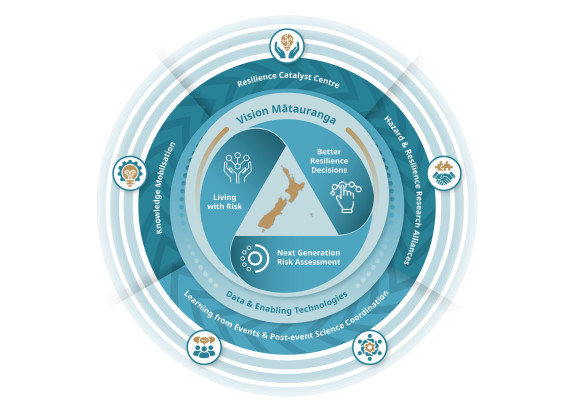
Natural Hazards and Resilience Platform
As a country exposed to significant natural hazards and a changing climate, Aotearoa New Zealand needs resilience research that brings together experts, organisations and communities.
Collaborative, user-focused research can support solutions that really make an impact, boosting the resilience of our communities and infrastructure.
About the Platform
The Natural Hazards and Resilience Platform (the Platform) is a collaborative natural hazards resilience research programme, with funding from the Ministry of Business, Innovation and Employment (MBIE) of $70 million over seven years (2024-2031).
The Platform is hosted by Earth Sciences New Zealand, and is mobilising scientists, resources, agencies and communities from around the country to collectively innovate to address our mission to enhance New Zealand’s resilience to natural hazards.
Platform purpose
The Platform will deliver the necessary science to strengthen New Zealand’s ability to prepare, respond and recover from natural hazard events, while also supporting our national science capability in hazard resilience and emergency management.
The Platform has a strong focus on working with research users, such as central and local government, iwi/Māori, and the infrastructure, insurance and other industry sectors.
As well delivering research, the Platform will also provide science capability during emergencies, and fulfil a coordination function during the science response to natural hazard events.
Background
The Platform builds on a substantial history of collaborative and multi-disciplinary natural hazards resilience research undertaken as part of the Resilience to Nature’s Challenges National Science Challenge(external link) (RNC) (2014–2024) and the Natural Hazards Research Platform (2009–2019).
A key aim of the Platform is to build on the national research strength and depth established under RNC, while progressing a future-focused research strategy.
Progress so far
In late 2024 and early 2025 the Platform team held a series of engagement workshops with key research users and the natural hazards research community. These discussions guided the development of strategic goals for the Platform, and identified the research priorities that will help us meet them.
In March 2025 the team delivered a Platform Plan to MBIE, which contains a research plan designed to meet the aspirations of research users and researchers.
Research structure
The Platform’s research will be driven across three main science themes:
- Living with Risk: Placing people at the centre of risk reduction and resilience and driving a shift toward a whole-of-society approach to strengthen New Zealand's capacity to plan, adapt, respond, and recover effectively from multiple hazard risks.
- Better Resilience Decisions: Supporting decisions made by the institutions, agencies and businesses charged with managing risk, through robust science-based information, tools and guidance.
- Next Generation Risk Assessment: Refining understandings of natural hazard processes, developing and testing new methodologies for quantifying multiple hazards and risks, and developing consistent and comparable hazard and risk information to support decision-making.
Two research programmes wrap around these core themes:
- Vision Mātauranga: Supporting community-driven research to ensure whānau, hapū and iwi determine their own resilience pathways, while building Maōri capability and capacity in resilience research.
- Data and Enabling Technologies: Lifting capability and bringing a greater focus to the innovation potential of data and enabling technologies in service of resilience science goals.

Capability Retention Grants
The Platform has provided early funding to a number of projects through Capability Retention Grants. These grants were designed to retain essential capability in the natural hazards and resilience research system, and make progress on priority work during the Platform's establishment phase. The projects all support students, post-doctoral positions and other early career researchers.
Leadership team
The Platform has appointed science leaders to provide strategic leadership for the core science themes and enabling programmes.
- Living with Risk theme: Assoc Prof Julia Becker, Joint Centre for Disaster Research, Massey University
- Better Resilience Decisions theme: Prof Iain White, University of Waikato
- Next Generation Risk Assessment theme: Prof Liam Wotherspoon, The University of Auckland
- Pou Whakahaere - Vision Mātauranga programme: Melanie Mark-Shadbolt (Ngāti Kahungunu ki Wairarapa, Ngāti Porou, Te Arawa, Ngāti Raukawa, Ngāti Tuwharetoa, Te Atiawa), CEO, Te Tira Whakamātaki
- Data and Enabling Technologies programme: Dr Bill Fry, Earth Sciences New Zealand
Next steps
In the latter part of 2025, we will hold further research workshops to shape up our themes and programmes and get started on priority projects. Sign up to receive Platform newsletters to stay in touch!
Status
Current
Duration
2024 – 2031
Programme leadership
Richard Smith, Director
Funder
Ministry of Business, Innovation and Employment (MBIE)